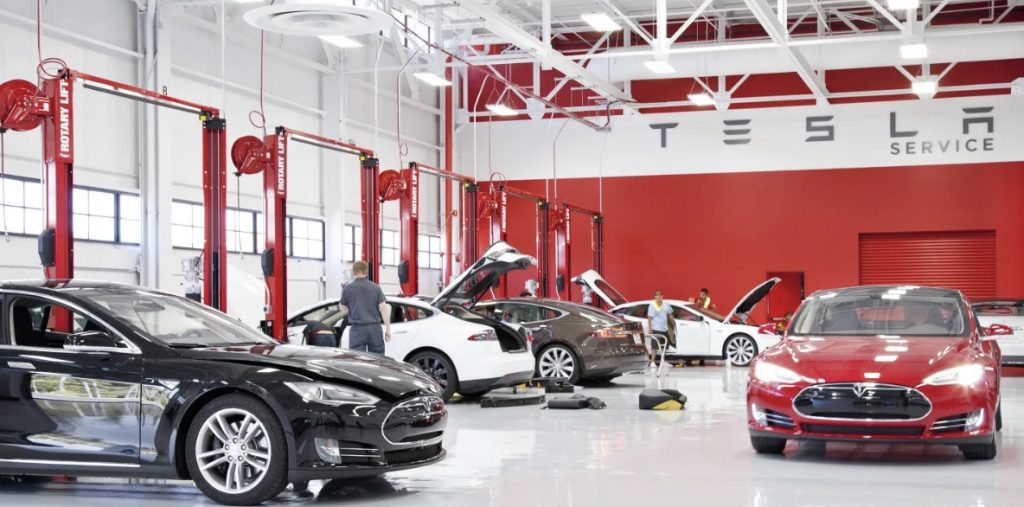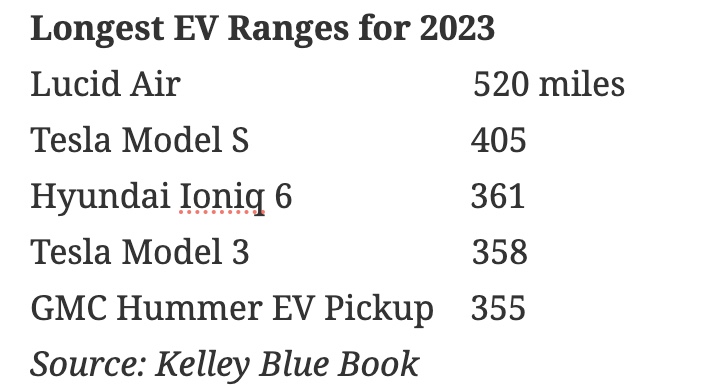
New vehicles, including EVs, up this year: According to the Cox Automotive U.S. new vehicle sales forecast released today, sales volume this month is expected to rise 6.2% over December 2022. The seasonally adjusted annual rate (SAAR) is expected to finish near 15.1 million in December. This SAAR is 1.6 million higher compared to last year’s pace. Stellantis is the only major automaker to have a decline in sales from 2022, and it only dropped down 2.1% from calendar year 2022. On the electric vehicle side, Tesla is expected to be coming in at 650,259 new vehicles sold this year. That’s up 24.5% from last year and puts the automaker at No. 8 in overall U.S. new vehicle sales for 2023, right ahead of Volkswagen and Subaru. Rivian is expected to have 50,749 units sold this year in the U.S., up 149.6% from the previous year; Lucid should be coming in at 5,764 units sold this year, up 117% from the previous year.
EVs included in UAW contracts: Member of the United Auto Workers were pleased to see that the contracts coming out of the six-week strike against Ford, Stellanitis, and General Motors, ensure that workers who build engines and transmissions today will still earn top union wages making electric vehicle (EV) batteries and components in the future. The agreements included commitments by the Big 3 to build future EVs in existing U.S. factories, which will further ensure job security for workers as the industry transitions over to meeting federal and state targets for reducing vehicle emissions.

COP28 saw clean transportation as part of the solution: Reducing fossil fuel consumption to fight climate change was the central theme at the United Nations (UN) Climate Change Conference in Dubai — COP28 — in an agreement signed by representatives of nearly 200 countries before the event closed on Dec. 12. North America played a leadership role in some landmark moments at the event, helping to accelerate the adoption of clean transportation technologies. The U.S. has made a $53.6 million commitment to developing countries for sustainable solutions to decarbonize urban transportation. The Zero Emission Vehicles Transition Council (ZEVTC) launched the Global ZEV Transition Roadmap, setting out for the first time in any global sector a holistic package of actions to systematically strengthen international support for emerging markets and developing economies (EMDEs) this decade. U.S. Environmental Protection Agency (EPA) Administrator Michael S. Regan added momentum by co-developing the roadmap. Vice President Kamala Harris furthered American support with a $3 billion pledge to the Green Climate Fund, an investment that will foster international collaboration for “low emission transport” via evidence-based methodologies.
Changes to Inflation Reduction Act: You don’t have to wait to file your taxes to get electric vehicle tax credits under 2024 changes coming to implementation of the Inflation Reduction Act of 2022, offering purchase price reduction at the point of sale. Once the new year starts, you can claim $3,750 if at least half of the value of your vehicle’s battery components are manufactured or assembled in North America. You can claim the other $3,750 if at least 40% of critical minerals — like graphite, lithium and cobalt — are sourced from the U.S. or a trade partner. Both minimum requirements increase in the coming years, with battery components reaching 100% in 2029 and critical minerals maxing out at 80% in 2027. Nearly 50 vehicles are eligible for one of or both credits under the new provisions — including EVs from Chevy, Ford, Tesla and VW — which are in effect through Dec. 31, 2032. The list of available EVs is expected to grow as manufacturers submit updated information and change suppliers. Find the most up-to-date info on FuelEconomy.Gov.
Support for EVs waning? There’s been a consensus agreement this year that electric vehicle sales are not doing well in the U.S. and that the charging infrastructure is just fine. That’s coming from media observers and investor analysts who have focused on automakers cutting back on their battery manufacturing plans. Tesla, Ford, GM and Rivian have been turning cautious and scaling back on, among other things, their battery manufacturing plans. But sales have suggested otherwise. The National Automobile Dealer Association (NADA) reported that through 11 months of 2023, battery electric vehicle sales totaled 1,007,984 – an increase of 50.7% year-over-year. It’s the first time EV sales in the U.S. exceeded the 1M sales threshold in a single sales year.
Cummins pays hefty penalty for using defeat devices. Cummins, a major manufacturer of diesel and alternative fuel engines and generators, and related components and technology, reached an agreement in principle with the U.S. and the state of California to pay a $1.675-billion penalty to settle claims that it violated the Clean Air Act by installing emissions defeat devices on 630,000 model year 2013 to 2019 RAM 2500 and 3500 pickup truck engines. Defeat devices are parts or software that bypass, defeat, or render inoperative emissions controls such as emission sensors and onboard computers. Cummins also allegedly installed undisclosed auxiliary emission control devices on 330,000 model year 2019 to 2023 RAM 2500 and 3500 pickup truck engines. Cummins has been cooperating with regulators on these matters. The company says that it has seen no evidence that anyone acted in bad faith and does not admit wrongdoing.
Buick dealers struggle with EV sales: As Buick prepares to switch over to electric powertrains only in its vehicle lineup by the end of the decade, dealers as struggling to determine if they’re going to stay in the network. About 47% of Buick dealers in the U.S. are looking to drop the Buick brand if they have to invest in electrification. That’s been the case with dealers in other brands, too, who’ve expressed concerns that car shoppers are still being very skeptical about whether an EV can give them what they need in driving range and the impact that harsh weather, especially during winter, will have on their EV performance. The challenge continues for dealers and their partners — automakers, charging networks, and electric utilities — to improve conditions for consumers and fleets that are looking at the possibility of acquiring EVs.
On the commercial fleet side, concerns are being expressed over the California Air Resources Board’s rules that would ban manufacturers from selling any new fossil-fueled medium-duty and heavy-duty trucks by 2040. The new rules would also require large trucking companies to convert their fleets to electric models, buying more over time until all are zero-emission by 2042. Some truck operators have expressed concern that CARB’s Advanced Clean Fleets regulation could drive many family-owned and smaller fleet operators out of business. But the incentives are plentiful from the Air Quality Management Districts, CARB, and other agencies. The charging infrastructure for electric trucks is getting better too, especially near the Ports of Los Angeles and Long Beach and in the Bay Area.
Worried about oil prices? For those of us who still rely in gasoline prices for the time being, there’s been a lot of concern about the war in the Ukraine, the Gaza Strip, and other tumultuous events that affect pricing. Prices had gone over $100 per barrel on the Brent benchmark rate, which took place after Russian supplies were disrupted following the start of the Ukraine war in 2022. It’s gone down to about $80 per barrel this year. A Reuters survey of 30 forecasts from economists and analysts sees Brent crude averaging $84.43 a barrel in 2024. Even though oil demand growth forecasts are strong, oversupply in the market should keep it around this price level, one global energy strategist predicts.



